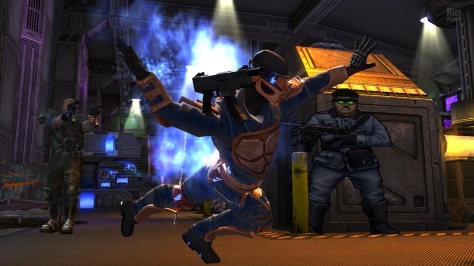
In an effort to begin a new tradition, my friend and I decided to kick off the New Year by completing a “bad” game. We’d done this previously, completing Fugitive Hunter: War on Terror at my behest back in 2012. It was a barely competent first-person shooter that was otherwise unremarkable, save for the ludicrous fistfight against Osama Bin Laden that capped it off. This year, we compiled a list of suitable titles from my collection, paired them against each other in the Tournament of Terribleness and wound up selecting Eat Lead: The Return of Matt Hazard as the game we’d start 2017 with. Oh boy.

Eat Lead was developed by Vicious Cycle Software and published by D3 Publisher for the Xbox 360 and PlayStation 3 on February 26, 2009. Adopting the third-person cover-based shooter formula that was all the rage at that point, gameplay was underwhelming and imprecise compared to peers like Gears of War and Uncharted: Drake’s Fortune. What drew us to this game in the first place though, was its purpose as a parody. Matt Hazard was portrayed as a video game character with a long history mirroring Duke Nukem’s and while the game’s story and dialogue were moronic, it was often humorous in that Adult Swim targeting males 18-34, kind of way. We chuckled frequently and enjoyed the myriad game references, but they weren’t enough to counter our misgivings with the gameplay. At the end of our playthrough, it was evident that we selected the right game to play.
No longer en vogue, Matt Hazard finds himself fighting for survival after Wallace Wellesley, the vindictive CEO of Marathon Megasoft, attempts to replace him with a new action hero. Aided by QA, a rogue employee reminiscent of Halo’s Cortana, Matt fights through the remainder of his comeback game, rescuing soon-to-be deleted heroes before winding up in the real world for a final showdown against Wellesley. The personification of these characters, also parodies, their exchanges, and the frequent one-liners from Matt and his foes, varied in levels of dumbness, and generally elicited snickers from my friend and me. It was a good time, all things considered. What wasn’t a good time was the moment-to-moment gameplay.

Each chapter saw Matt navigating different settings but they were mostly drab and generic. We’d mow down dozens of enemies as we zigzagged through hallways and open environments better suited for large shootouts, repeating this progression for about an hour until defeating an end of chapter boss. The diversity of enemies and their weapons of choice (all hailing from Matt’s previous games) remains one of the surest positives I can generate in retrospect. As a whole, the lead up to each chapter’s conclusion was uninspired and boring, usually featuring little of note and a dearth of strategy. The consolidation of chapter two’s objectives into “shoot anything that moves” sums up the game’s philosophy quite succinctly. Boss fights were the exception, offering a level of extravagance and entertainment not seen in the core progression of the game.
Being an achievement nut, I decided we ought to play on the hardest difficulty which maximized our frustration and issues with the gameplay. A few shootouts in the later chapters had us stuck in seemingly near-impossible scenarios. We lost about 250 lives in the last few chapters and yes, we counted. It was a mistake to play on this difficulty (that achievement was NOT worth it!) but I suspect that had we not, we’d still develop a malaise for the repetitive combat. Neither of us ever felt like our control of Matt and ability to efficiently and effectively eliminate enemies was precise or “right.” There’s a certain “it” factor to some games where they just feel “right” and it’s hard to point out the various factors that lead to it, but easy to point out games that lack it, and this one belongs to the latter group.

There’s something intriguing about Eat Lead’s premise, but the developer’s execution left a lot to be desired (like, grenades, they would’ve been nice!). We enjoyed pointing out all the video game references and the narrative, while, insignificant and sophomoric, kept us pushing to see what would happen next. I’d be remiss not to mention the well-cast voice work of Will Arnett and Neil Patrick Harris, voicing the protagonist and antagonist, respectively. But, I’d also like to point out Scott Menville’s role which immediately made me recall his neurotic character from Mission Hill and all the nights I watched it in high school… Anyways, despite the entertainment of the game as parody, there was minimal enjoyment from the gameplay. It was a competent third-person cover-based shooter that lacked a combat identity. There are worse games, to be sure, but the combination of lackluster action and stupid hard difficulty left us with a degree of suffering that was befitting our intentions.
